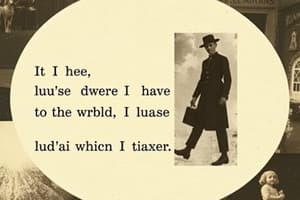Podcast
Questions and Answers
Match the following infinitive verbs with their past simple forms:
Match the following infinitive verbs with their past simple forms:
go = went choose = chose sing = sang run = ran
Match the past simple verbs with their past participle forms:
Match the past simple verbs with their past participle forms:
taught = teach drank = drunk lied = lied built = built
Match the following infinitive verbs with their past participle forms:
Match the following infinitive verbs with their past participle forms:
shine = shone drive = driven find = found break = broken
Match the following past simple verbs with their infinitive forms:
Match the following past simple verbs with their infinitive forms:
Match the following verbs based on their forms:
Match the following verbs based on their forms:
Match the past participle verbs with their infinitive forms:
Match the past participle verbs with their infinitive forms:
Match the following pairs of verbs based on tense:
Match the following pairs of verbs based on tense:
Match these verbs with their correct forms:
Match these verbs with their correct forms:
Flashcards are hidden until you start studying
Study Notes
Irregular Verbs in English
- Irregular verbs are verbs that don't follow the standard conjugation rules for creating past tense and past participle forms.
- The table shows the infinitive, past simple, and past participle forms of common irregular verbs.
- Past Simple is the form of a verb for actions that happened in the past.
- Past Participle is usually used with helping verbs like “have” or “has” to create a perfect tense.
Examples of Irregular verbs
- The verb "be" has multiple forms (was/were) depending on the subject (I was vs. they were).
- The verb "go" has the past simple form "went" and the past participle form "gone."
- The irregular verb "have" has forms like "had", "has", "having", and "have".
- Some verbs have the same form for all three tenses (for example "hit").
- There are many irregular verbs in English, but the table provides a helpful resource for learning them.
Studying That Suits You
Use AI to generate personalized quizzes and flashcards to suit your learning preferences.




